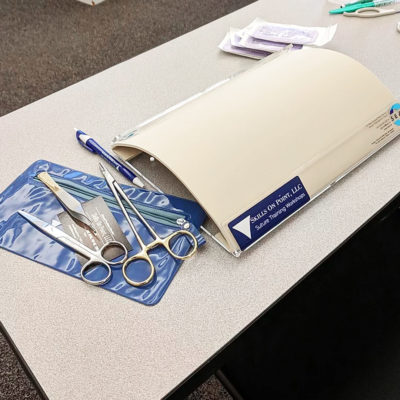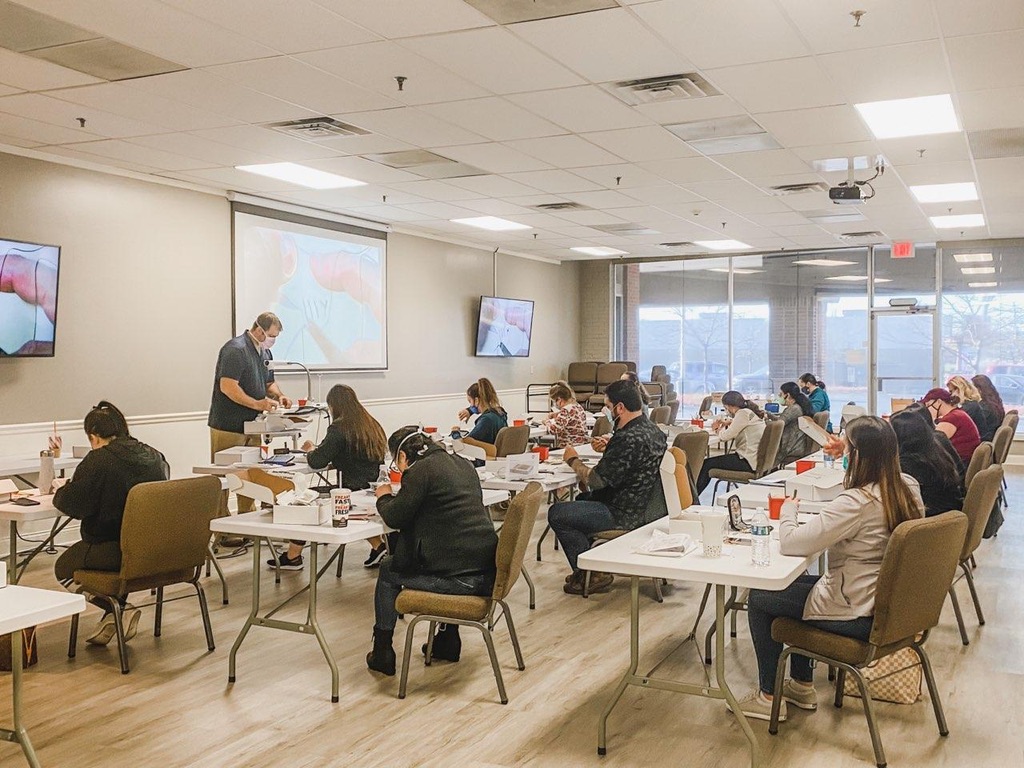Initial and continuing education for new skills and procedures seldom come cheap. In fact, they seem to only be found as an offshoot of a larger conference in the form of a a la carte pre-conference session that requires even more time and money to attend. I never understood that. I mean, yes, the speakers that come and provide sessions on more vague and theoretical goo are ok, but when it comes down to it, you paid to walk away as a professional with something that will change your ability with a new skill, increase revenue to your practice, or help you get a new job which requires a specific skillset.

I have been asked many times why Skills On Point was formed. For me, it was out of the exact issue above. I hate fluff. I hate it with a passion. Nothing makes me more disinterested than to go to a three-day conference to find the only value add was a breakout session in a vendor room where I got to put my hands on a new medical device. Or to pay extra to go to a pre-conference for a skills session. I know I am not alone in my frustration, can you relate? With that in mind, I wanted to discuss briefly what you can do in the current environment to guarantee you get what you actually paid for when you sign on the dotted line for live or online CME for nurse practitioner courses or nursing CEU courses focused on hands-on skills.
Step 1: Look at the accreditation
Probably the first stop in critically evaluating a course to participate in will need to be the accrediting body. Please make sure you attend a course that is accredited for continuing education hours since in most cases, it will need to be approved for contact hours to have an employer reimburse your enrollment. There are many options to consider, but the main two are AANP and ANCC for nurse practitioners, AAPA for physician assistants, AAFP prescribed credit, ACCME or PRA category 1 for physicians, or any approved state board of nursing. My point is not to provide an entire list of your accrediting bodies, as you likely already know them. My point is to make sure you choose one that fits your unique continuing education requirements. The most common question we receive at Skills On Point is are AANP and ANCC credit interchangeable? The answer is yes, they are, with the exception of nurse midwives, who are required to use AANP. Skills On Point aligns with ANCC for our accreditation for nurse and nurse practitioner CEUs because it is accepted in all 50 states and boards of nursing and is usable for other practitioners such as emergency medical services as well in most instances.
Step 2: Look at the instructor
It is hard to know what you get when you peruse a course and see the instructor’s name. Do a little digging. What are their credentials? Honestly, this is a hard one to find sometimes, so you can always look at course reviews also if it has been reviewed and see what former students say about the experience. Is the instructor primarily academic or clinical? Where do they practice? How far down the rabbit hole of expertise have they gone in what you want to know? How big are the classes? More students is not always better. You should look for a reasonable teacher-student ratio and training environment that optimizes your individual learning potential. I say this because I have undergone larger trainings that seemed more popular and was left wondering why I was paying good money to sit in an audience and teach myself with near zero 1:1 time with the instructor and gear that was simply laughable.
You need an instructor that knows more than you as the student. I say that tongue in cheek, because I certainly hope they do, but when your instructor is attempting to teach you a skill that is beyond their scope, it shows. Your instructor needs to be an expert. They need to do this skill frequently on real patients and they need to be at a level higher than the audience. For this reason, anyone who teaches at Skills On Point in the suturing courses must be a first assistant in surgery. There is no exception to this because was have many people who look to use our training as a gateway to assisting in the operating room, we must be able to speak to that level of expertise. Training by someone who has only worked in a family practice environment will simply be a limitation to the available depth and breadth of technique the learners should know how to manage, even if they don’t themselves perform it. This also why our courses are widely considered the most in-depth on the market short of a formal first assisting program.
Step 3: Look at the gear
This is a biggie. I don’t know why this gets a pass as often as it does, but the quality of gear used in medical education in most courses is simply laughable. And I understand why, because cheap gear is far more readily available than nice gear if you don’t want to spend time or money to find it. There is a kit of instruments floating around on the internet that has about a dozen different brand names but the kit is all the same. Cheap silicone “skin” model with some cuts already made in it, sub-awful grade instruments that do not belong in a middle school biology class, and a package of sutures. They might also come with a few disposable scalpel blades as well, and in my experience about half of the time can actually fit safely on the knife handle. I’ve paid hundreds of dollars for courses and received a piece of memory foam to suture on, needle holders without any teeth, and used hotdogs or pigs feet. I think we all can safely say this is not quite doing justice to your skills training. Half of the course I spent fighting the abhorrent equipment and the other half I spent learning a few simple techniques and wondering where my money went. And by the way, you can find any of these complete kits for under $20, so if you spent 600-700 dollars, where exactly IS your money going?
This is also a big reason that Skills On Point exists: to give you what you paid for. You will find that for our hands-on courses, you spend nearly 100% of the time with your hands doing skills rather than listening to lectures. You can learn online for many of the more “soft skills” and we have a fantastic online learning management software that we use to break up most content we offer into smaller microlearning snippets which you can go back to as many times as you want. You came to learn live, so we will spend the time to give you your money’s worth.
Our live courses include some of the most innovative and highest quality gear on the market. If you take a suturing course, for example, you get a set of OR-grade tungsten carbide instruments as well as a suturing pad that is exclusive to Skills On Point through our distributor in Sweden and a custom made multiple layer skin pad that is so realistic, it even has proper fascia planes and globby fat. You just don’t find that in a block of silicone with several cuts in it. We also let you borrow instruments that cost hundreds to thousands during the training based on the course, so you get to work with professional-grade gear you will see in practice.
If you take a procedural course, know that we use only the highest quality and recognizable brands that give the student a realistic experience. Ultrasound machines, phantoms, torsos, and simulators all are very expensive, but we believe worth it for you to get the most realistic training that actively mirrors what you will be doing in practice. Brands like Butterfly Network, Sonosite, CAE Blue Phantom, Stryker, Maquet, Terumo, to name a few.
What makes Skills On Point different than our competitors?
If you haven’t already noticed, we exist to spend your registration back on you and nothing makes us more happy to see you walk away the smartest person in the rooms you will enter with your skill set. People who take our CME for nurse practitioner courses routinely tell me they have many firsts at our courses. The first time this technique has “clicked” for them or the first time they got a good answer for “why this does that”, or so forth. We will make sure your training counts. It’s not a box to check, it’s somebody’s life we’re dealing with and I, for one, believe that deserves a bit more realism than what I’ve seen for my own nursing training. If you’re interested in learning more about our fantastic live CME courses, check out our new enrollment map HERE that shows the breakdown of all our live courses in our COVID-friendly training center in Rockford, IL.



